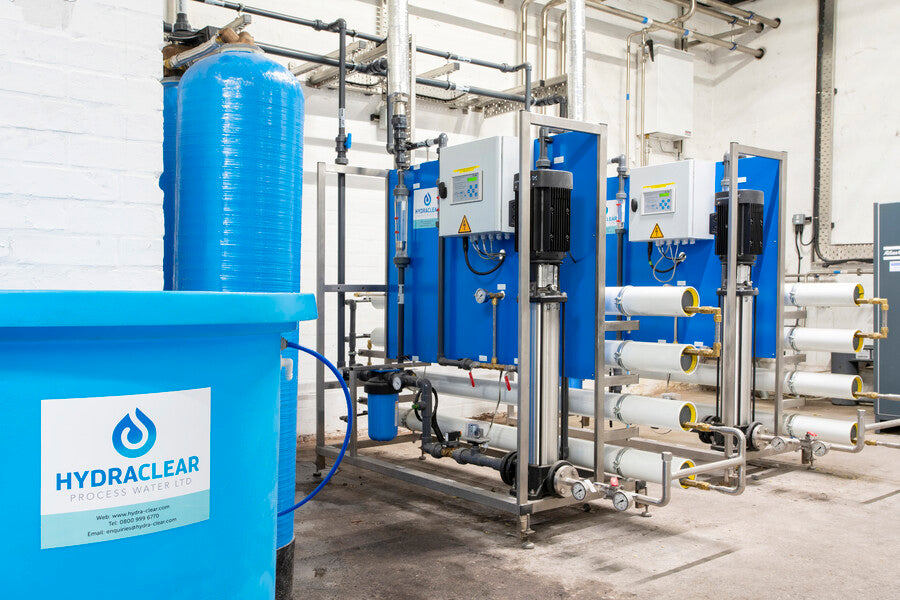Water is a vital resource for many industrial processes, but not all water is created equal. In fact, using the wrong type of water can lead to serious problems, including equipment damage, product defects, and safety hazards. One type of water that has been the subject of much discussion in industry is demineralised water. In this article, we will explore the benefits of using demineralised water in industry, and help you make an informed decision about whether this type of water is right for your business.
Deionised water or D.I. water, is water that has been stripped of its natural mineral content. This highly purified form of water has become increasingly essential in a variety of industries, including manufacturing, pharmaceutical production, breweries, nuclear power, and more. This blog post delves into the technical details, facts, and figures that illustrate the benefits of using demineralised water in these applications. We'll explore why this purified water is critical to each industry and how it contributes to overall efficiency, cost savings, and improved product quality.
Industrial Manufacturing
In the realm of industrial manufacturing, demineralised water is crucial for numerous processes. Its high purity ensures that any possible contaminants are removed, thereby reducing the risk of impurities affecting the final product. This ultimately results in improved product quality and lower defect rates. Some key applications include:
- Cooling systems: Demineralised water is used in closed-loop cooling systems to prevent scaling and corrosion, thus extending equipment life and reducing maintenance costs. A study by the Cooling Technology Institute (CTI) found that the use of demineralised water in cooling towers reduced scale formation by 95%.
- Boiler feed water: In power plants, demineralised water is used as boiler feed water to prevent scaling and corrosion, ensuring efficient heat transfer and reducing energy consumption. This leads to cost savings and a reduced environmental footprint.
Pharmaceutical Production
The pharmaceutical industry demands the highest levels of purity for water used in various production stages. Demineralised water plays a vital role in ensuring compliance with stringent regulatory requirements:
- Cleaning: Demineralised water is used for cleaning and sterilization purposes, reducing the risk of cross-contamination between different batches of products.
- Formulation: In the production of injectables, ophthalmic solutions, and other sensitive formulations, demineralised water ensures product safety and efficacy by preventing the introduction of impurities.
Breweries
Water quality is an essential factor in the brewing process, as it directly impacts the taste and quality of the final product. Demineralised water offers several benefits to breweries:
- Consistency: By using demineralised water, breweries can create a consistent baseline for their water profile, allowing them to produce beer with a stable taste across different batches.
- Customization: Demineralised water allows breweries to tailor their water profile by selectively adding back minerals and salts, thereby creating unique flavor profiles for various beer styles.
Nuclear Power
The nuclear industry demands the highest level of purity for water used in reactor cooling systems and other applications. Demineralised water is essential for ensuring the safe and efficient operation of nuclear facilities:
- Corrosion prevention: Demineralised water minimizes the risk of corrosion in cooling systems and reactor vessels, extending the life of expensive equipment.
- Neutron moderation: In nuclear reactors, demineralised water acts as a neutron moderator, helping to control the rate of nuclear reactions and maintain stable operating conditions.
Other Applications
Demineralised water is also vital in other industries such as:
- Electronics: In the production of semiconductors, demineralised water is used for cleaning and rinsing to ensure a high level of purity in the final product.
- Automotive: Demineralised water is often used as a coolant in radiators, preventing scaling and corrosion, which can lead to engine overheating and damage.
- Laboratories: Research facilities and analytical laboratories use demineralised water as a solvent for preparing reagents and in various testing processes.
By eliminating impurities, demineralised water reduces the need for costly maintenance, repairs, and replacements caused by scaling, corrosion, and contamination. This translates into prolonged equipment lifespans and minimized downtime, which further contribute to overall operational efficiency. In addition, demineralised water allows for greater precision and customization in applications like brewing and electronics, enabling the production of unique, high-quality products that can yield higher profit margins.
While the initial investment in demineralisation systems may be higher compared to conventional water treatment methods, the long-term benefits of using demineralised water far outweigh the costs. The efficiency improvements, reduced maintenance expenses, and enhanced product quality achieved through the use of demineralised water ultimately lead to significant financial savings and a competitive edge in the market.
As industries continue to evolve and face increasing challenges in terms of quality, safety, and sustainability, the adoption of demineralised water becomes not just a best practice but an essential strategy for staying ahead in today's competitive global market. By embracing the numerous benefits of demineralised water, companies can optimize their operations, reduce costs, and contribute to a more sustainable and efficient future.

